|
|
|
Sort Order |
|
|
|
Items / Page
|
|
|
|
|
|
|
| Srl | Item |
| 1 |
ID:
144567


|
|
|
|
|
| Summary/Abstract |
In the mid-2000s, Beijing made a series of unilateral trade concessions with respect to agricultural trade with Taiwan. This move distressed the then incumbent party of the Republic of China, the Democratic Progressive Party (DPP), because Beijing’s offers might weaken the DPP’s rural support. This article offers the first empirical assessment of Beijing’s trade concessions. Using an original and highly disaggregate dataset at the township-product level, it examines what types of regions were more likely to be the beneficiary of the trade concessions, whether the concessions caused any production change, and the extent to which these changes undermined the DPP’s electoral support. It is found that while the benefit of tariff concession was not confined to pro-DPP regions, the townships that grew tariff-reduced products were no less likely to vote for the DPP. The result suggests a limit of Beijing’s economic enticement.
|
|
|
|
|
|
|
|
|
|
|
|
|
|
|
|
| 2 |
ID:
178733
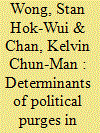

|
|
|
|
|
| Summary/Abstract |
Why would dictators purge members of their ruling coalition? Some argue that doing so can minimize the risk to dictators’ political survival, while others contend that dictators who mount purges are motivated by the desire to share resources with fewer allies. In this study, we analyze an original dataset, compiled from biographical data on the subordinates of the founding emperors of seven ancient Chinese imperial dynasties. Analyzing the data with competing risks models, we find that military experience is a strong predictor of political purges. Emperors were less likely to execute officers who had fought in more battles, but more likely to execute commanders, especially those who had established military credentials prior to the founding of an empire. In addition, the incidence of political purges heightened toward the end of an emperor’s life, which implies that the founding emperors were concerned about the security threats against their designated successors. Potential challengers came not only from the military, but also from the aristocracy. Indeed, we find that the blood relatives of the emperors were more likely to experience a mild form of purges: deprivation of titles. These findings suggest that dictators are more likely to use purges to reduce existential threats.
|
|
|
|
|
|
|
|
|
|
|
|
|
|
|
|
| 3 |
ID:
188955


|
|
|
|
|
| Summary/Abstract |
In his seminal book Exit, Voice, and Loyalty, Hirschman suggests that loyal members are less likely to exit when dissatisfied with the performance of the organization. In the context of a political regime, however, we argue that loyalty may actually encourage exit because loyal members are more sensitive to the performance decline of the regime. Using an original survey conducted in Hong Kong, we show that survey respondents with a stronger local identity have greater migration intentions. We also find that the heterogeneity of perceived political changes plays a significant role as a mediator. We discuss the political implications for Hong Kong.
|
|
|
|
|
|
|
|
|
|
|
|
|
|
|
|
| 4 |
ID:
169962


|
|
|
|
|
| Summary/Abstract |
Political selection in China has received increasing scholarly attention. Conventional measures of political promotion may suffer measurement error because of an (implicit) assumption that the chance of cadre promotion is constant across government and party units after controlling for their hierarchical rank. In this article, the validity of this assumption is tested. Based on the analysis of the biographical data of thousands of provincial bureau leaders, a strong agency effect is identified; leaders coming from politically important bureaus—defined by their connections to the Central Committee of the ruling party—stand a significantly higher chance of promotion than those coming from the less important ones. Incorporating the agency effect, the authors develop a continuous measure of political turnover. Using this refined measure, the authors revisit the effect of economic performance on provincial cadre promotion. While a positive relationship is found, the effect is arguably too small to be substantively significant.
|
|
|
|
|
|
|
|
|
|
|
|
|
|
|
|
| 5 |
ID:
162095
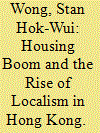

|
|
|
|
|
| Summary/Abstract |
Localist parties have become an emerging force in Hong Kong’s political landscape. What has caused the rise of localism in the city? Extant studies focus on cultural and social factors. In this article, we propose a political economy explanation: global and regional economic factors have caused a housing boom in Hong Kong since the mid-2000s and produced impactful redistributive consequences. While homeowners benefit tremendously from the hike in asset prices, non-homeowners stand to lose. Their divergent economic interests then translate into political preferences; homeowners support political parties that favour the status quo, while non-homeowners tend to support those that challenge it. Using a newly available public opinion survey, we find preliminary evidence in support of our argument. In particular, homeowners are less likely to identify with localist parties and tend to vote for pro-establishment ones. High-income earners, however, are more likely to vote for localist parties.
|
|
|
|
|
|
|
|
|
|
|
|
|
|
|
|
| 6 |
ID:
158538
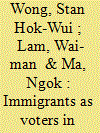

|
|
|
|
|
| Summary/Abstract |
Migration to electoral autocracies has become increasingly common. Extant studies, however, accord little attention to the immigrants' influences on the domestic politics of these regimes. We argue that immigrants have attributes (status quo bias and lack of prior exposure to local politics) that make them an attractive co-optation target of the authoritarian regime. We provide a case study of mainland Chinese immigrants in Hong Kong to illustrate our argument. Since the sovereignty transfer, the Hong Kong government has devised various schemes to attract these immigrants, while pro-establishment political parties and groups have actively sought to co-opt them. Using two distinct public opinion surveys, we also find that immigrants are more likely to approve of the political and economic status quo, and less likely to vote for pro-democracy opposition parties than the natives. In addition, we find no evidence that exposure to political information can change the immigrants' vote choice.
|
|
|
|
|
|
|
|
|
|
|
|
|
|
|
|
| 7 |
ID:
181401


|
|
|
|
|
| Summary/Abstract |
Scholars of electoral autocracies accord far more attention to post-election protests than pre-election ones, as the former have the potential to trigger a regime transition. We argue that pre-election protests can have a significant effect on election outcomes. In particular, they are likely to deepen social cleavages along two dimensions: age and immigrant status. The 2019 social unrest in Hong Kong provides a unique opportunity to evaluate the electoral impact of pre-election protests. Comparing public opinion data related to the 2019 and 2015 District Council elections, we find strong empirical support for our argument, as immigrant status and age are strong predictors of voting choices and voter turnout. Our findings imply that exposure to democratic protests may not help in bridging the gap in political attitudes between immigrants and natives.
|
|
|
|
|
|
|
|
|
|
|
|
|
|
|
|
| 8 |
ID:
137206
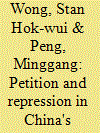

|
|
|
|
|
| Summary/Abstract |
China has established a petition system to elicit information about grievances. However, the petition system may have perverse effects because it also reveals to the center the failure of local-level officials to resolve those grievances. Anecdotal accounts suggest that local officials have incentive to silence petitioners, often with the use of repression. In this article we study whether non–regime threatening petitions would provoke local governments' coercive response. To tackle the endogenous relationship between petition and repression, we take advantage of a natural experiment afforded by a change in hydroelectricity policy in China. In particular, we use provincial hydropower outputs as an instrument to identify citizen petitions. We find that citizen petitions significantly increase a province's spending on its repressive apparatus. The results suggest a paradoxical outcome of China's petition system: while it may help reduce the national authority's use of repression, it has caused an explosion of repression within the authoritarian system as a whole.
|
|
|
|
|
|
|
|
|
|
|
|
|
|
|
|
| 9 |
ID:
189973
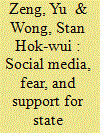

|
|
|
|
|
| Summary/Abstract |
Even in authoritarian regimes that enforce vigorous information controls, netizens are still able to access fairly diverse – sometimes even sensitive – information from social media than from traditional media. We argue that this ‘breathing space’ in social media may have an indirect positive effect on regime stability via a subtle emotional channel; exposure to news on social media heightens one’s generalized fear, which in turn increases one’s demand for social controls by the state. We test our argument using an original survey that evaluates public support for China’s social credit system. We find that the support for this seemingly all-encompassing surveillance system is positively correlated with one’s generalized fear, while one’s generalized fear is positively correlated with one’s exposure to news on WeChat, the most popular social media platform in China.
|
|
|
|
|
|
|
|
|
|
|
|
|
|
|
|
| 10 |
ID:
178884
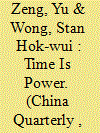

|
|
|
|
|
| Summary/Abstract |
Whether local officials in China are promoted on a meritocratic basis has been the subject of long-standing debate. Merit is commonly gauged by a leader's ability to deliver local GDP growth. Although some find economic performance to be a strong predictor of the career success of local leaders, we argue that the existing measure, which focuses on the promotion outcome of a single career step, is problematic because the career success of individual local leaders is seldom determined by a single promotion, or the lack thereof. We propose an alternative measure that is more suitable for China's political context: the length of time until promotion. Analysing the time it takes to gain promotion for four types of local leaders, we find that good economic performance is associated with a shorter time until promotion. However, the cumulative time-reducing effect of economic performance is far from significant, as it is generally insufficient to help local leaders overcome the age ceiling for promotion.
|
|
|
|
|
|
|
|
|
|
|
|
|
|
|
|
|
|
|
|
|